- Home
- Tim Tingle
Danny Blackgoat, Navajo Prisoner
Danny Blackgoat, Navajo Prisoner Read online
Danny Blackgoat, Navajo Prisoner
Tim Tingle
7th Generation Summertown,
Tennessee
© 2013 Tim Tingle
Cover and interior design: Deirdre Nemmers
All rights reserved. No portion of this book may be reproduced by any means whatsoever, except for brief quotations in reviews, without written permission from the publisher.
7th Generation, an imprint of
Book Publishing Company
PO Box 99, Summertown, TN 38483
888-260-8458
bookpubco.com
nativevoicesbooks.com
ISBN: 978-1-939053-03-9
18 17 16 15 14 13
1 2 3 4 5 6 7 8 9
Printed in the United States
Library of Congress Cataloging-in-Publication Data
Tingle, Tim.
Danny Blackgoat, Navajo prisoner / Tim Tingle.
pages cm
ISBN 978-1-939053-03-9 (pbk.) -- ISBN 978-1-939053-89-3 (e-book)
[1. Conduct of life--Fiction. 2. Navajo Indians--Fiction. 3. Indians of North America--Texas--Fiction. 4. Prisoners--Fiction. 5. Bullies--Fiction. 6. Navajo Long Walk, 1863-1867--Fiction. 7. Fort Davis National Historic Site (Tex.)-- Fiction.] I. Title.
PZ7.T489Dan 2013
[Fic]--dc23
2013013183
Book Publishing Company is a member of Green Press Initiative. We chose to print this title on paper with 100% postconsumer recycled content, processed without chlorine, which saved the following natural resources:
• 28 trees
• 877 pounds of solid waste
• 13,097 gallons of water
• 2,415 pounds of greenhouse gases
• 13 million BTU of energy
For more information on Green Press Initiative, visit www.greenpressinitiative.org. Environmental impact estimates were made using the Environmental Defense Fund Paper Calculator. For more information visit www.papercalculator.org.
Contents
Chapter 1: Soldiers at Sunrise
Chapter 2: Death on the Walk
Chapter 3: Tumble into Cactus
Chapter 4: Burning Saddle
Chapter 5: No Home for Troublemaker
Chapter 6: A New Navajo Family
Chapter 7: Mean Mr. Dime
Chapter 8: Danny Saves a Friend
Chapter 9: Mr. Dime and the Rattlesnake
Chapter 10: Death of Fire Eye
Chapter 11: Fangs of Poison
Chapter 12: Leather Vest for Jim Davis
Chapter 13: Return to Danger
Chapter 14: The Gift of Freedom
Chapter 15: Mr. Dime’s Final Act
Chapter 16: Life Inside the Coffin
Chapter 17: Good-bye to Jim Davis
Author’s Note: The Long Walk of the Navajos
About the Author
To Angelika Douis, who cares for the elders.
Danny Blackgoat, Navajo Prisoner
Tim Tingle
Chapter 1
Soldiers at Sunrise
Canyon de Chelly, New Mexico, 1863
Danny Blackgoat was sixteen years old when he learned a hard truth. Life can change in a moment. Death can ride the blade of a knife or the pop of a gun. You never know when to expect it, but one thing is certain: Death is cold and dark.
Every morning, long before sunrise, Danny Blackgoat led his sheep out the gate of the tiny corral near his home. He held the gate open and tenderly patted his sheep on the back as they squeezed through the opening. His four-legged friends were more like pets than livestock.
“Crowfoot!” he shouted. His favorite sheep rubbed against him as he moved through the gate. “You’re getting so big, Crowfoot, soon you won’t be able to fit through the gate.” Crowfoot was the smallest of the twenty-four sheep in his flock.
As he closed the gate, Danny looked to the sky. The moon was sinking below the mountains and the sun was rising. The sky changed from the dark of night to the blue of dawn. But Danny noticed that this dawn was different. A cloud of dust was rising from the south, turning the sky a dark orange.
“Looks like a storm is blowing up,” he said to himself.
He broke into a run, hurrying the sheep before him. Danny led them down a narrow trail at the end of Canyon de Chelly, where they grazed on the tall grasses.
As the sun rose, Danny climbed a steep path to a cave on the canyon wall. He looked down at his family hogan, his home. Built like a dome with six sides, the hogan was made of mud and wood and stones.
Danny turned his gaze to the cornfields and the neighboring hogans. He saw his oldest neighbor, Mr. Begay, carry a wooden bucket of water from the spring to his peach trees.
“He loves those trees,” Danny thought.
He smiled as the old man knelt and spoke to the skinny peach trees.
“He speaks as if the trees can hear him.”
Mr. Begay lived with his wife in one hogan, while his daughter and her family lived next door to them.
Danny looked to the east, to the rising sun. A small deerskin pouch hung from a leather cord around his neck. Danny took corn pollen from the pouch and sprinkled it on the dawn. Then he said a prayer his grandfather had taught him:
When morning casts its light on the canyon walls
A new house is made,
A house made of dawn.
Before me everything is beautiful.
Behind me everything is beautiful.
Above me everything is beautiful.
Below me everything is beautiful.
Around me everything is beautiful.
Within me everything is beautiful.
Nothing will change.
But change came in a cloud of dust and fire. Danny saw the cloud grow closer and closer. In the full light of day, he saw a hundred soldiers riding across the sands. They were dressed in blue uniforms and held their rifles high.
“American soldiers,” he thought. “What do they want?”
A soldier pulled his horse to a stop in front of Danny’s hogan. He aimed his rifle to the sky and fired.
POW!
Danny’s father heard the noise and ran from the hogan. As Danny watched, the soldiers leaped from their horses. They grabbed his father, pinned his arms behind his back, and wrapped a rope around his waist.
“Stay inside!” his father shouted.
But it was too late. Four soldiers entered the hogan. In less than a minute they reappeared, with Danny’s mother and sister flung over their shoulders like bags of flour. The soldiers tied his mother and sister too. Danny dashed down the path, pushing the sheep before him.
Soon a new cloud burst into the sky, a red and yellow cloud of flames. Danny Blackgoat’s house was on fire! The soldiers had made torches of cloth and branches and had tossed them into the hogan.
Danny gathered the sheep and hurried them to the corral at the rear of the house. He tried ducking and hiding behind the walls of the corral but the soldiers saw him.
“Look! There’s an Indian boy! Grab him!” a soldier yelled.
Two strong soldiers held Danny’s arms. Another tied his wrists and circled the rope around Danny’s waist. They carried Danny to the front of the burning house and threw him to the ground, next to his mother, father, and sister, Jeanne.
“Bring the sheep!” shouted a soldier. “They need to see this, especially that boy.”
The soldiers paraded the sheep in front of Danny and his family. One soldier lifted a knife with a sharp blade. He looked to the Blackgoat family and waved the knife in the morning sun.
“Bring me a sheep!” he shouted.
A soldier dragged a large male sheep before him, grabbed him by the ears, and tilt
ed his head back. The first soldier placed his knife on the sheep’s neck and pulled his arm back hard, slicing a deep cut. The sheep kicked and shook as blood poured from his throat.
“Bring that one,” the soldier shouted, flicking the blood from the knife blade.
Danny froze in horror. He was pointing to Crowfoot!
Danny twisted and turned, trying to free himself. He kicked one soldier in the shin and elbowed the other in the stomach. He dashed to Crowfoot, wrapped his arms around him, and carried him behind the burning house.
As he was turning the corner he heard a shotgun blast.
POW!
The sound rang in his ears. Danny blinked his eyes and shook his head. His face and arms were covered in blood. A soldier had shot Crowfoot in the head.
The soldier grabbed Crowfoot by the leg. He ripped him from Danny’s arms and flung him over his head and into the still fiery remains of the house.
“Kill the others and let’s get moving!” shouted the officer in charge. “We have a long day ahead of us.”
“What should we do with the family? They’ll slow us down,” a soldier said.
“Get them to the corral,” said the officer. “Make sure they’re tied up good. Pick two men to help you watch over them. We’ll bring more in the morning. We’ll fill up that corral with Indians.”
By the next evening, four hundred Navajos crowded together in the tiny corral. They had been captured and herded like animals.
“How long have you been here?” an old man asked Danny.
“Since yesterday morning. I was grazing our sheep. They rode up from the south and burned our home.”
“They burned ours, too,” the man said, hanging his head. “My mother was too old to walk. I still don’t know if she got out of the house.”
“Where is your family?” Danny asked.
“It’s just me and my wife,” he said, nodding to a thin woman with wrinkled skin. Her dark hair was tied in a bun. She turned to Danny with a bright look in her eyes.
“My name is Frances Whitehorse,” she said. “And this is my husband, Joe Whitehorse.”
“I am Danny Blackgoat. My family is here,” he said, pointing to his parents and his sister, Jeanne. They were clumped together under a single heavy blanket, hiding from the dust and noise.
“We can stay together, your family and mine,” said Mr. Whitehorse. “Will that be all right?”
“Yes,” Danny said. “That’s a good idea. Nobody knows what they will do to us. Maybe we can help each other.”
Chapter 2
Death on the Walk
An hour before sundown, a wagon appeared at the gate of the corral. Four soldiers leaped from the wagon and one shouted, “Everyone! On your feet! Make a line. Leave the babies behind.”
No one moved. No one understood him.
“Looks like we have to show these dumb Indians how to make a line,” he said, spitting and shaking his head. “We should just shoot ’em and be done with it.”
The soldiers entered the corral and started poking people with their rifle barrels. One soldier lifted an old man to his feet.
“Move!” he shouted. “If you want to eat, get on your feet!”
He pushed the old man to the gate and waved his arms at the others. A long line of Navajo people moved slowly through the gate.
From the rear of the wagon, a cook gave everyone a piece of dried wheat bread. Another dipped a tin cup in a water bucket. Everyone got one piece of bread, which they ate while standing, and drank water from the same cup.
Danny waited in line behind his family. When his turn came, he reached for the cup and drank it in a hurry. The cook tapped Danny on the shoulder. When Danny looked up, the cook handed him a wet rag.
“Wash that blood off, son. Go ahead. Clean yourself up.”
The cook had a friendly look on his face. He touched a streak of dried blood on Danny’s arm, Crowfoot’s blood, and made a scrubbing motion.
Danny nodded. The cook pointed to the ground behind him. Danny sat down and wiped the blood of his favorite sheep from his neck and arms. He turned his face away so no one would see him crying.
The next morning a bugle call sounded before sunrise. The soldiers hurried about, saddling their horses and packing their gear. One hundred soldiers soon surrounded the tiny corral.
“Move!” an officer shouted.
The Navajo people stood and shuffled through the gate.
“Where are we going?” Danny asked, looking to his father and Mr. Whitehorse.
They did not reply. Danny could tell it was best to stay very quiet. He looked over his shoulder and saw Mr. Begay and his family trailing after everyone.
Walking behind the dancing, anxious ponies, the people coughed and choked on the dusty road. In two hours they topped a small hill and looked down at a green valley. A bubbling creek flowed through the valley.
Danny knew this place. During the long, dry summers, he and his father rode their ponies to the spring. There they filled leather bags with water.
Before leaving the spring, Danny’s father always gave him a wool blanket, made by his mother. Then they would ride to the nearest hogan and Danny would present the blanket to the people who lived there.
“Always leave a gift to say Ahéhé, thank you, to our friends who live by the water,” his father told him. “They are jewelry makers. They’ll like the blanket.”
The beautiful hogan, once covered with bright silver stars, was gone. Smoking boards poked through the dirt, like broken ribs from an old man’s skin.
“I hope they are still alive,” Danny whispered.
“They are good Navajo people,” his father said.
They soon passed a shallow canyon, an arroyo. A thin stream of water snaked through the arroyo and green cedar trees rose from the rocks. Like embers from a dying fire, burned and smoking hogans lined the banks.
A soldier rode his horse up and down the line of walkers.
“Halt!” he shouted, over and over, holding his hand high. “Halt!” he shouted to the Navajo walkers. “Move to the trees!”
The wagon pulled to a stop. A soldier grabbed two buckets and ran to the stream.
“Line up! Time to eat!” he called out.
No one moved. The Navajos turned their backs to the trees and the burning hogans. Danny stood beside his grandfather.
“No one wants to be here,” Danny said.
“You should not want to be here either, grandson. The smell of death is all around us. People died in these hogans. We should move.”
Everyone, all of the Navajos, felt the nearness of death. They would never have their noon meal by this arroyo, surrounded by burning hogans. Without a word between them, the four hundred Navajos started walking. Soldiers rode their horses in front of the line to stop them. The Navajos walked around the horses as if they weren’t there.
“Halt!” the soldiers shouted. Three soldiers pointed their rifles to the sky and fired.
POW! POW! POW!
Instead of halting, the Navajos walked faster. They passed the lead wagon. A young woman started running. Others followed.
The officer in command called to his men, “Move aside!” He nodded to a young man riding beside him. “You know what to do,” he said. “We talked about what to do if they tried to run.”
“Yes,” the young soldier replied.
He stepped slowly from his horse. He took his rifle from the leather holding pouch and checked to make sure it was loaded.
The Navajos ran faster. Old men and women hurried along. Even Mr. Begay ran, old man Mr. Begay! Dust rose from the road as the crowd of people moved away from death.
But death came.
The young soldier lifted his gun to his shoulder. He took slow and careful aim.
POW!
Mr. Begay fell to the ground. His daughter screamed and knelt over him.
POW!
The daughter fell.
The Navajos came to a halt. They made a wide circle around Mr. Begay and hi
s daughter. Both lay bleeding from wounds to their backs.
“That will stop them,” declared the officer. “Good shooting,” he said, nodding to the young soldier.
“Thank you, sir,” the young man replied. He felt proud.
“What should we do with the bodies?” a soldier asked.
“Leave ’em where they are,” said the officer. “They can step around ’em. And no bread today. No water, either. Let’s make this a day they will never forget.”
Chapter 3
Tumble into Cactus
The second day of the Long Walk, Danny planned his escape. He pulled and tugged on the rope that tied his wrists together. When a soldier rode by, he hung his head and carried his wrists in front of him, like everybody else.
As soon as the soldier was gone, he wrestled with the rope. By the afternoon of the second day, he slipped his wrists from the knot. His hands were free!
“Danny! What are you doing?” his father asked.
“Don’t worry,” Danny said. “I won’t let the soldiers see.”
He retied the rope loosely around his wrists, so it looked as if he were still bound. When the waterman arrived with his bucket, Danny held his wrists together.
“I could take the cup in my hands,” he thought. “But I can’t let him know.”
Danny tilted his head and opened his mouth. The soldier lifted the cup to his lips and Danny swallowed. The waterman was in a hurry. An older woman drank too slowly and he poured the cup of water on her face.
“No more water for you today!” he hollered.
That night they camped by a small creek. The soldiers filled their canteens. The waterman filled ten buckets with creek water. He and his helper carried the buckets to his wagon.
“Enough water for a week,” he said.
That night Danny did a dangerous thing. He waited until everyone was asleep. The moon was low in the sky and only one soldier stood guard over the camp. Danny slipped his wrists free of the rope.
He crawled to the rear of the waterman’s wagon and climbed inside. As quiet as a snake, he found a bag of tin cups. He took one cup only, so it would not be missed. He tucked the cup under his shirt.

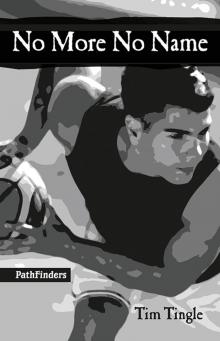 No More No Name
No More No Name Trust Your Name
Trust Your Name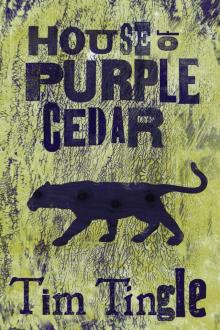 House of Purple Cedar
House of Purple Cedar NO-NAME
NO-NAME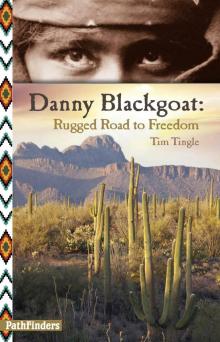 Danny Blackgoat: Rugged Road to Freedom
Danny Blackgoat: Rugged Road to Freedom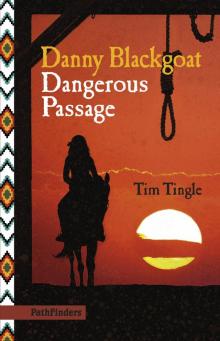 Danny Blackgoat
Danny Blackgoat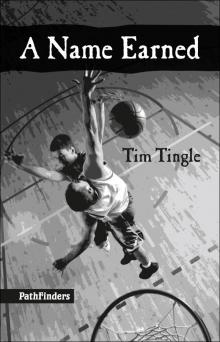 A Name Earned
A Name Earned Letter to Belinda
Letter to Belinda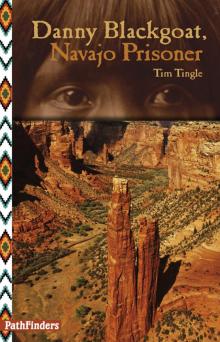 Danny Blackgoat, Navajo Prisoner
Danny Blackgoat, Navajo Prisoner